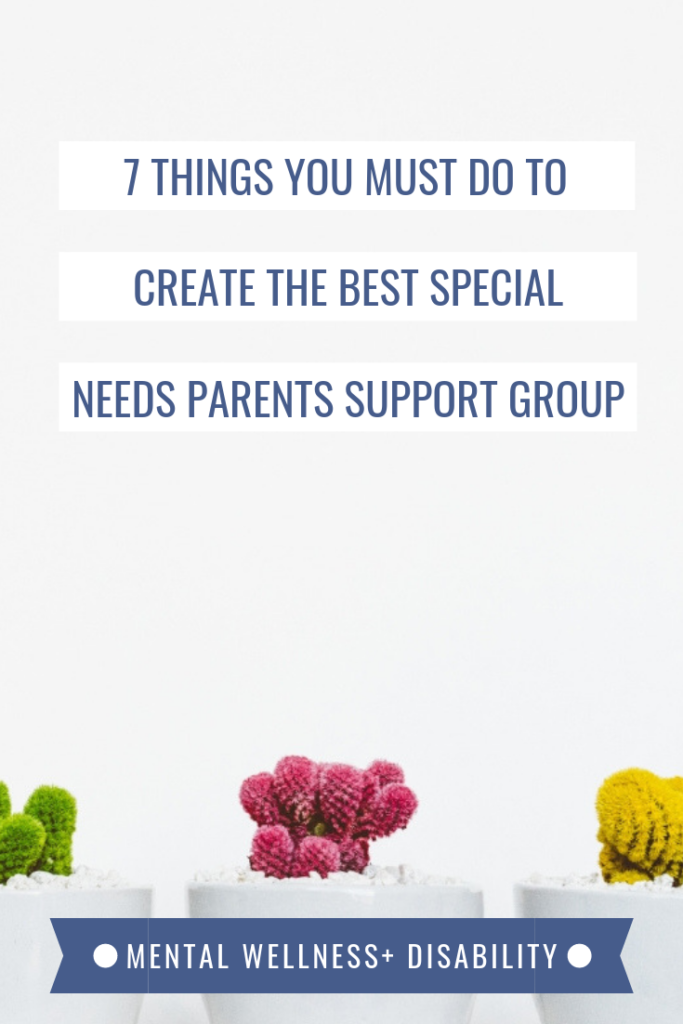In my counseling practice, I offer therapy to special needs parents. Some of the parents I’ve worked with have considered starting a peer-led support group for special needs parents. These parents often cite their disappointment in other, poorly run groups as a motivator to create something better. If that resonates with you, read on to learn the 7 things you must do to create a special needs parents support group that’s actually supportive.

Why special needs parents join support groups, and why they stop going to them
Raising a child with special needs is tough. You’re doing your best to parent a child that the world doesn’t appreciate, and that even you don’t always understand. Some days, it can feel like you’ll never escape certain things.
- Your search for answers. You have to keep searching, because you have to believe that there ARE answers out there. Because the alternative is just too terrifying.
- Constant adjustment to the ‘new normal’. Just when you feel you’ve found a routine that works something changes, and there’s a domino effect.
- Frustration with your spouse or other family members who don’t seem to understand the reality that you’re facing, even though you’re all living it.
- Exhaustion. Will anyone in your home ever sleep again?
- Isolation. You feel distanced from your career, your other children, your friends, your spouse…maybe even yourself.
- Fear. What will the future hold? How will you cope with it? And how will everyone else cope when you no longer can?
With all these stressful feelings at play, it’s completely understandable that you’d want to seek out support. And it makes perfect sense that the best support might come from others who’ve lived it.
So why is it that so many special needs parents wind up writing off support groups?
In my experience, many group founders have the best of intentions. But, there are some common issues that I’ve seen that have derailed support groups. Inconsistent meetings, undirected conversation, and inappropriate group member behavior are chief among them. If you’re considering starting a peer-led support group for special needs parents, here are the steps you can take to avoid falling into those common traps.
The 7 things you should do to make sure that your support group is actually supportive to special needs parents
Don’t just have a vision. Write it down.
Many parents who create support groups are looking to foster an environment of compassion and openness. They worry that developing a mission statement, communication rules, or other guidelines for the group will be limiting. They fear that setting boundaries will make people feel unwelcome. “This is a support group!”, they argue. It shouldn’t feel corporate or penned in.
In fact, nothing could be further from the truth. The best support groups are very clear in outlining their mission, their rules, and their guidelines for member behavior. Rather than feeling limited, most group members find that these rules give them comfort and confidence to interact openly.
Here are some examples of the kinds of written guidance that a great special needs parent support group might have:
- No selling or unsolicited contact outside of the group
- A confidentiality agreement
- An attendance commitment
- A guidance document outlining communication (That racist, homophobic, or otherwise derogatory language won’t be tolerated. That all group members are welcome to share, but that no one should feel forced to share.)
Guidelines like these are the anchors that keep support groups from becoming unruly. A group having these kinds of rules in place demonstrates a commitment to keeping the group sustainable and welcoming to all.
Limit resource sharing
If you put a group of special needs parents in a room, conversation will almost inevitably involve resource sharing. Which developmental pediatrician’s office has the best meltdown-avoidance procedures in place? Which support provider agency has the least turnover and callouts? These are the things that special needs parents talk about when they get together.
The trouble is, some support groups maintain this ‘surface level’ support. There’s no encouragement to go deeper, to talk about how you’re really coping with the tougher aspects of special needs parenting. The guilt, fear, and sadness. The unforgiveable thoughts. The stuff that can’t be summarized by a meme.
There is a time for resource sharing. It can be invaluable to reflect on and learn from the experiences of other families as you navigate all the appointments, therapies, meetings, and decisions.
But, a resource share masquerading as a support group is downright unhelpful.
Because there are parents in the room who are suffering in silence. These brave parents came ready to bare their deepest thoughts and scariest feelings to perfect strangers. The chance to be heard and understood by someone who gets it was worth the emotional risk. These parents are a combustible mix of vulnerable and tenacious. A discussion about the merits of eliminating red dye 40 from your family’s diet is a poor substitute for the support they really need.
One way to ensure that your group stays focused is to set a theme for each meeting and have pre-planned conversation starters.
Say, for example, your group supports parents of Neurodiverse kids. One meeting’s theme might be ‘Coping with the social challenges that your child faces’. You might have some conversation starters like:
- Knowing when to push and when to allow natural consequences
- What are my feelings, and how do I deal with them, when my child tells me they’re lonely?
- How do I accept that my child doesn’t seem to want to make friends?
You can also be ready with some conversation enders. So, if conversation drifts away from these topics and gets mired in resource sharing, you can say:
“It seems that we have a new discussion starting, but I wonder if everyone was finished with the first conversation. Let’s get back to our theme for the evening.”
Have a plan to deal with dominating group members
In many groups, there are one or two members who don’t seem tuned in to the spirit of the group. They dominate conversation. If you share a struggle, they share a more elaborate and dramatic one.
Even in many therapist led-support groups, a group member may seek to dominate the conversation.
The difference is that handling this kind of group member is part of our training as counselors. And a professional moderator isn’t going to lose sleep over redirecting a group member to more appropriate and helpful conversation. But, it can be harder to deal with this person in a peer-led group.
But deal with it you must, because even just one group member with the tendency to ‘one-up’ or outtalk the others can spoil an otherwise supportive environment.
Don’t wait for this member to join your group.
Before you even advertise your group’s first meeting, have a plan for how you will manage a group member who seeks to dominate the conversation.
Keep in mind, they are probably not doing this out of a desire to control or quiet others. It’s more likely that this is the first environment where they’ve felt heard and understood. Sometimes people are so overwhelmed by that feeling that they don’t realize how much they’re talking.
In that spirit, you can say something like:
Diane, you’ve been generous in sharing your experience and insights. Now let’s open the floor for others to talk for the rest of our time together.
It’s never easy to redirect someone in this way. Being ready for it makes it easier to do when the time comes that you have to.
I recommend you practice this gentle redirection often. One easy way to do this is to watch a TV show and pause the program at the points where you’d want to redirect a character who’s been dominating conversation. Say out loud the things that you would actually say in a support group setting.
Guard your own time and energy ferociously
Support groups are often started by parents who are passionate, caring, dedicated individuals.
Sometimes though, the support group founder’s passions get diverted. Perhaps they have limited control over what’s happening. Say, for instance, your child develops a new medical issue, or your job becomes more demanding.
Of course, special needs parents are notorious for saying yes to obligations that they really don’t have the time or energy for. Maybe you’ve taken on additional responsibilities at your child’s school or at church.
The reality is that a support group suffers if its leader is stretched too thin due to competing commitments. If you see a need in your community for a support group, it’s understandable that you want that need to be met. But, I believe its important to question if you’re truly the best one to meet it.
Members will come to depend on a great support group. They can be a powerful place where healing and acceptance happen. But all those wonderful outcomes are only possible if the group actually happens.
This may mean saying no to other commitments that you feel compelled to say yes to. If you struggle with that, try using an Eisenhower box, my favorite time management tool for special needs parents.
No pitches
This is rare, but I have known some support groups that are sponsored by a business or otherwise partnered with one. In these cases, it can feel like every struggle that someone tries to raise is met with a sales pitch by the group’s sponsor.
Members aren’t getting support, so much as they’re being marketed to.
If you’re considering a partnership with a business to financially support the group, I urge you to consider whether alternate funding could be available. Special needs parents are some of the most resourceful people I know. You can figure something else out, I know it!
Be ready to refer out
Sometimes, a parent needs more than what a peer-led support group can offer. Sometimes it’s clear that a group member is battling depression, anxiety, or another mental health challenge. Even though it’s clear that they’d benefit from meeting with a counselor, it can be difficult to know what to do in these times.
Many support group founders worry that they’ll be perceived as turning someone away if they recommend that they meet with a counselor. They also aren’t sure if it’s OK to be so blunt in pointing out that a member is struggling.
The thing is, most people will genuinely appreciate if you say to them: “I see you struggling, and I want you to feel better. Can I give you the name of a counselor who has helped me/other group members/etc. when they were hurting?” Sometimes, this outward acknowledgement of their suffering is the just nudge they need to make a therapy appointment.
Make sure that the person you’re referring to is a licensed mental health professional. Someone who markets themselves as a wellness consultant or health coach is not licensed, meaning that they are not able to diagnose and treat mental health conditions.
The person you refer group members to should be a Licensed:
- Psychologist
- Professional Counselor
- Marriage and Family Therapist
- Clinical Social Worker
Some support groups will invite counselors to their regular meetings or to a special event to talk about the specific challenges faced by special needs parents. This is a great way to help your members build trust in the helping professionals in your community. You can also have a parents’ resource table with brochures set up at each meeting. Keeping these resources visible is a powerful way to help de-stigmatize and normalize counseling as a perfectly fine way to deal with stress. Ultimately, this helps your members get connected with the resources in your community that can help them through the tough times.
Meet regularly and show up
I saved the most important point for last.
A good support group should meet consistently as scheduled. Even if it’s the busy holiday season, or if your child is sick. The group should still meet, and you should be there.
Consistent meetings are a commitment to your group members. Showing up when you say you will is communicating that you see your members’ need for this healing, accepting space.
You committing to consistent meetings is also is a powerful reminder to group members that we each get to control our lives.
Locus of Control
Therapists refer to the concept of Locus of Control. This is the extent to which you believe that have the power to influence the events in your life. A person with an internal locus of control sees that she can influence events and their outcomes. In contrast, someone with an external locus of control blames outside forces for everything, and feels quite powerless to effect change in their life.
This classic article, Moderators of Stress in Parents of Children with Autism, notes that, for parents raising Autistic kids, having an external locus of control is:
“linked to depression and anxiety in response to negative life changes…Reminiscent of learned helplessness, individuals who experience stress and view themselves as having no control over events may be most susceptible to the influences of life stress.”
When you uphold the commitment to your support group in spite of life’s stressors, you are communicating a belief that you are in control of how you devote your time and energy. Yes, life happens and it gets messy some days. But in spite of that, you see that you are in command of choosing to spend time with other parents in the same boat. No matter what new thing comes your way, you are demonstrating that your commitment to the group is high on your priority list.
I sincerely hope that you found these tips helpful!
Please use the social share buttons to spread this post to others who may want to read it. You can also read about my favorite support group activities for parents raising kids with disabilities in this post!












